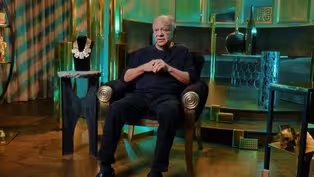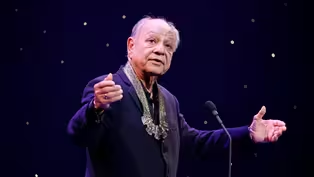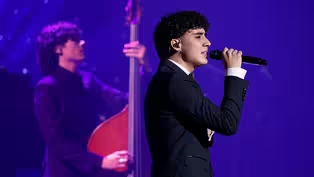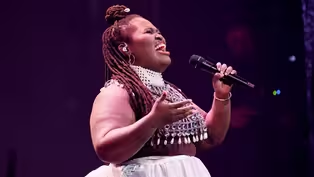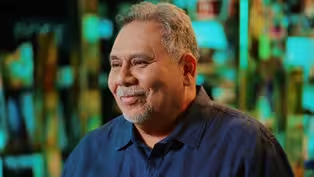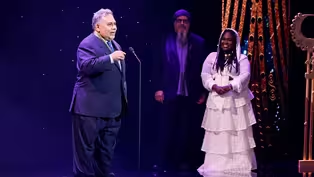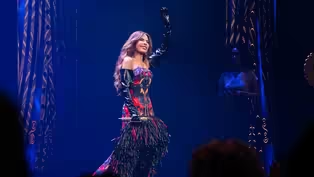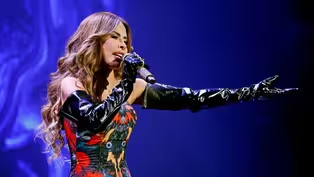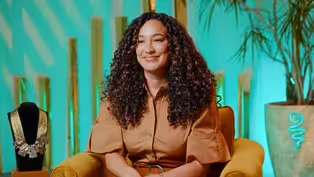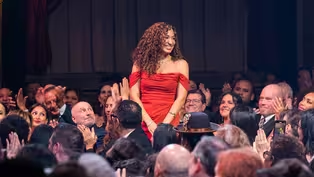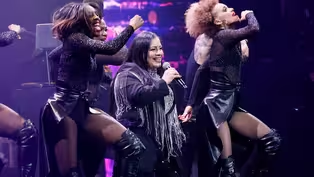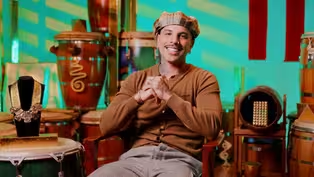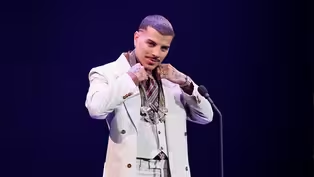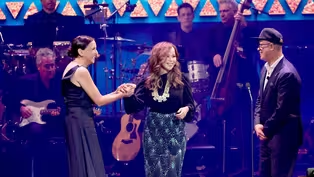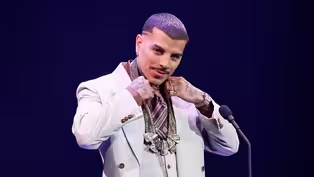
38th Hispanic Heritage Awards
Season 2025 Episode 1 | 55m 35sVideo has Closed Captions
Celebrate Latino cultural icons Cheech Marin, Rauw Alejandro, Rosie Perez, Gloria Trevi, and more!
Celebrate Latino cultural icons Cheech Marin, Rauw Alejandro, Rosie Perez, Gloria Trevi, & more! With performances & appearances by DannyLux, Lisa Lisa, RaiNao, Daymé Arocena, Gloria Trevi, Ivy Queen, Gina Torres, Menudo, and more.
Problems playing video? | Closed Captioning Feedback
Problems playing video? | Closed Captioning Feedback

38th Hispanic Heritage Awards
Season 2025 Episode 1 | 55m 35sVideo has Closed Captions
Celebrate Latino cultural icons Cheech Marin, Rauw Alejandro, Rosie Perez, Gloria Trevi, & more! With performances & appearances by DannyLux, Lisa Lisa, RaiNao, Daymé Arocena, Gloria Trevi, Ivy Queen, Gina Torres, Menudo, and more.
Problems playing video? | Closed Captioning Feedback
How to Watch Hispanic Heritage Awards
Hispanic Heritage Awards is available to stream on pbs.org and the free PBS App, available on iPhone, Apple TV, Android TV, Android smartphones, Amazon Fire TV, Amazon Fire Tablet, Roku, Samsung Smart TV, and Vizio.
Providing Support for PBS.org
Learn Moreabout PBS online sponsorship♪ DANNYLUX: Ya no estás.
♪ ♪ Y esta noche tan callada me consume más.
♪ ♪ Hay un fantasma que me acaricia con tu mirada.
♪ ♪ Y aquí estoy yo, ♪ ♪ deseando que otra vez sienta tu amor.
♪ ♪ Yo te amé.
♪ ♪ Tanto que te escribí canciones ♪ que nunca te enseñé.
♪ Te amaba tanto que se me olvido como quererme.
♪ ♪ Quisiera ser feliz, ♪ ♪ pero aprendí que sin ti esto no es vivir.
♪ ♪ Tal vez es necesario, ♪ ♪ que sienta tanto daño.
♪ ♪ Este frío en el alma, ♪ ♪ y el duro desengaño.
♪ ♪ Nunca pude expresarlo.
♪ ♪ Por eso escribo y lo canto, ♪ ♪ oh-oh.
♪ ♪ ♪ ♪ ♪ ♪ ♪ ♪ Ya no estás.
♪ ♪ Y esta noche tan callada, ♪ ♪ me consume más.
♪ ♪ Hay un fantasma que me acaricia, ♪ ♪ con tu mirada.
♪ ♪ Y aquí estoy yo.
♪ ♪ Deseando que otra vez sienta tu amor.
♪ ♪ Tal vez es necesario, ♪ ♪ que sienta tanto daño.
♪ ♪ Este frío en el alma, ♪ ♪ y el duro desengaño.
♪ ♪ No pude expresarlo, ♪ ♪ pero me hiciste tanto daño.
♪ ♪ La idea de siempre estar solo, ♪ ♪ ya no me sorprende.
♪ ♪ Ya no estás.
♪ ♪ Y esta noche tan callada ♪ ♪ me consume más, ♪ ♪ más, ♪ ♪ más.
♪ ♪ Hay un fantasma, ♪ ♪ que me acaricia, ♪ ♪ con tu mirada.
♪ ♪ No siento nada.
♪ ♪♪ (audience cheering and applause).
ANNOUNCER: Welcome to the 38th Hispanic Heritage Awards!
Tonight, we honor: Cheech Marin, Felix Contreras, Gloria Trevi, Julissa Prado, Rauw Alejandro, and Rosie Perez.
Featuring: DannyLux, Lisa Lisa, RaiNao, Gloria Trevi, Daymé Arocena, Ivy Queen, Gina Torres and more... Please welcome your host, Mayan Lopez.
MAYAN: ¡Hola mi gente!
Welcome to the historic Warner Theatre and the 38th Hispanic Heritage Awards!
We are here in our nation's capital, and there is a lot that could be said about that, but we're not going to do that, because tonight is a celebration.
I want the energy to be like a Bad Bunny residency concert up in here!
(audience cheering and applause).
Okay, okay, very good.
But please, please keep your bras on, this is still PBS.
To help me introduce our first Honoree, who's like a tio to me, right Cheecho?
Please welcome star of "Landman," and the star of "911: Lone Star," Paulina Chávez and Julian Works.
PAULINA: Our first honoree has been in the game so long each generation knows him for completely different things.
For instance, if you're a millennial, you probably know him as Uncle Felix from the "Spy Kids" movies.
JULIAN: And if you're a little older, maybe you know him as Inspector Joe Dominguez on six seasons of "Nash Bridges," or from his film directorial adventure "Born in East LA."
PAULINA: We probably all know him from his comedy and musical act with his friend and creative partner, Tommy Chong.
Their lifelong partnership is known for breaking ground for Latino comedians, winning a Grammy Award, and yielding a film that's been included in the Library of Congress National Film Registry for its "cultural, historical, or aesthetic significance."
JULIAN: But what most people don't know about him is that he's been a student of art and art history since he was a child.
I mean over the last 50 years, he's amassed the largest private collection of Chicano art in the world, I mean leveraging his celebrity to bring this artistic movement to some of the most important galleries and institutions in the country.
PAULINA: And with the Cheech Marin Center for Chicano Art & Culture, or "The Cheech", open in Riverside, California, there is now a permanent home for his collection, an institution dedicated to Chicano art, at a time when seeing our humanity, our truths, and our experiences couldn't be more important.
JULIAN: Let's learn more about our 2025 Arts Award Honoree, Cheech Marin!
CHEECH: Any time you go to a big museum, you see all those kids in the same colored T-shirts holding hands.
That was me.
Then I went to LACMA here in L.A., and now I'm on the board of directors there, you know.
So, you know it's a, it's a... that's nice.
I was living in Canada for three years.
I went up there ostensibly to be a potter.
At the same time, I was part of the draft resistance movement because it was like 1968.
The Vietnam War was raging, and I was very against the war, as were most of the people that I knew.
My roommate in, in, in Banff where I was living.
He said, "Come with me.
I'm going to Vancouver, that's where I'm from.
And we could, we could room together.
And, you know, you dig Vancouver it's really cool."
That's what we did.
He, he knew I was a writer from music magazines you know, and so they were starting the magazine up there, and he said, do the same thing here.
At some point, the publisher of, of the magazine, he says, you know, I got this guy you should meet.
He's doing this weird thing, his name's Tommy Chong, and he's doing this improv company in a topless bar.
So right away I'm interested, you know.
That troupe broke up.
Tommy called me one night and said, "Well, let's do it.
You and me together.
You're a singer, I'm a guitar player.
We'll make a band and we'll do a bits and then we'll play music and, you know, maybe we'll play lounges in, in Vegas or something."
Like, oh, sounds good to me, you know.
One night to Lou Adler, who was the world's biggest record producer at that time, saw us.
Coincidentally, he had grown up in East LA.
He understood what we were doing right away.
So, he put us in the studio, and then we released our first album, and immediately it was a big hit.
The collecting bug started way, way earlier.
I was always a collector of something.
So, when I had some money, all of a sudden and we were traveling throughout the U.S., I started collecting Art Nouveau pieces and have to carry them with me on the plane, you know?
And then Art Nouveau got very expensive, so I got to find something else.
And that's when I discovered Chicano art.
The gap in my knowledge about art history was contemporary art.
I was married to a painter at the time.
She started taking me to contemporary galleries in LA, and that's when I saw the first Chicano painters as Carlos Almaraz, Frank Romero, and I was intrigued right away.
I knew what the art was because it was built upon their classical education, because all these artists, it wasn't naive art, backyard hobbyists art, they all had went... gone to prestigious art schools.
They knew art history combined with their Mexican heritage, and now their Chicano heritage.
And the Chicanos said "We are Mexicans on this side of the border and we're planting our flag here."
Nobody was collecting it on a large scale.
Nobody that I knew, you know.
And so, I had money.
(laughs).
You can't love or hate Chicano art unless you see it.
Okay, you have to see it.
So how do I make it available for you to see?
So, I started talking to people, and they go, oh, they really intrigued the art because the collection was large now and then one thing led to another and it started gaining traction.
And so, we started doing a big national tour in one museum after the other.
And I was buoyed by the fact that every museum we'd play, we broke attendance records.
We did a show in Riverside, California.
They were gonna to build a new library, and they said, we have to repurpose this building or knock it down.
We would like to offer you the museum for the collection.
I was really struggling with this because it took me over 50 years to amass this collection.
I was walking through the, the building when they were tearing it out and I said, "How big is this building?"
Because it's a big building.
I said, she said, "Well, it's 66,420 square feet" and I go, "420?
That's the sign."
Thank you so much for a sign that's the sign.
And I did that.
And that's the best decision I ever made in my life.
It's the proudest I am of anything I've ever done, because this is the legacy that is for everybody in the family and every part of the community.
You don't have to be Chicano or not.
And it keeps going.
And this is the thing that will last for generations, you know?
So, I mean, how can you not be proud of that?
RENÉ: Our next artist started performing this song when she was a teenager in 1985.
JANVIER: And ever since it became a Freestyle smash hit, it's been interpreted, sampled and referenced by artists across genres like the Black-Eyed Peas, Missy Elliott, and Pitbull.
RENÉ: Celebrating 40 Years of her single "I Wonder If I Take You Home."
BOTH: Lisa Lisa!
(audience cheering and applause).
♪ BACKGROUND VOCALS: Home, home, home, home.
♪ ♪ LISA LISA: Baby.
♪ ♪ I know you're wondering, ♪ ♪ why I won't go over to your place.
♪ ♪ 'Cause I'm not too sure about how you feel.
♪ ♪ So, I'd rather go at my own pace.
♪ ♪ Come on.
♪ ♪ ALL: And I know and you know that if we get together.
♪ ♪ LISA LISA: Emotions will go to work.
♪ ♪ ALL: And I may do something I might ♪ ♪ regret the next day.
♪ ♪ LISA LISA: And end up hurt.
♪ ♪ Oh, I don't know.
♪ ♪ BACKGROUND VOCALS: I just don't know.
♪ ♪ LISA LISA: That's the way that I feel.
♪ ♪ I'm so afraid of a one-night deal.
♪ ♪ BACKGROUND VOCALS: I need you so.
♪ ♪ LISA LISA: I wonder if I take you home would ♪ ♪ you still be in love, baby.
♪ ♪ ALL: Because I need you tonight.
♪ ♪ LISA LISA: I wonder if I take you home would ♪ ♪ you still be in love baby.
♪ ♪ ALL: Because I need you tonight.
♪ ♪ Oh, oh.
♪ LISA LISA: Come on y'all!
♪ ALL: Home, home, home, home.
♪ ♪ LISA LISA: Lately you've been expressing to me, ♪ ♪ just how much you want to make love.
♪ ♪ ALL: I want it just as much as you do.
♪ ♪ LISA LISA: Will you still keep in touch?
♪ ♪ Yeah.
♪ ♪ ALL: And you say I'm teasing but I do have a reason.
♪ ♪ LISA LISA: Don't let your feelings fade.
♪ ♪ ALL: 'Cause you will have me and sooner ♪ ♪ than you know it.
♪ ♪ LISA LISA: If you could only wait.
♪ ♪ Oh, I don't know.
♪ ♪ BACKGROUND VOCALS: I just don't know.
♪ ♪ The way I feel.
♪ ♪ LISA LISA: I'm so afraid.
♪ ♪ BACKGROUND VOCALS: I need you so.
♪ LISA LISA: Come on, everybody!
♪ I wonder if I take you home would you still ♪ ♪ be in love baby?
♪ ♪ ALL: Because I need you tonight.
♪ ♪ LISA LISA: I wonder if I take you home would ♪ ♪ you still be in love baby.
♪ ♪ BACKGROUND VOCALS: Because I need you tonight.
♪ ♪ LISA LISA: I wonder if I take you home would ♪ ♪ you still be in love baby.
♪ ♪ BACKGROUND VOCALS: Because I need you tonight.
♪ ♪ LISA LISA: I wonder if I take you home would you ♪ ♪ still be in love baby.
♪ ♪ ALL: Because I need you tonight.
♪ ♪ Oh, oh.
♪ ♪ Oooh.
♪ ♪ Na, na, na, na, na, na, na, no!
♪ ♪ Na-oh!
♪ ♪ BACKGROUND VOCALS: Take me home!
♪ ♪ LISA LISA: You're down on your knees, ♪ ♪ begging me, please.
♪ ♪ Oh-oh!
♪ ♪ BACKGROUND VOCALS: Take me home!
♪ ♪ LISA LISA: Take you home!
♪ ♪ Ho-ome!
♪ ♪ BACKGROUND VOCALS: Take me home!
♪ ♪ LISA LISA: Will you still love me ♪ ♪ if I take you home?
♪♪ (audience cheering and applause).
DAYMÉ: Starting work in TV news in his native northern California before joining NPR in 2001, Felix Contreras has been telling the stories of our community and our culture for 48 years.
(audience applause).
STEVE: And through it all, he's carried his love for music of all kinds, whether it's Santana, Los Lobos, Celia Cruz, the Grateful Dead, or the late Eddie Palimieri, it doesn't matter, if Felix thinks it's cool, he's going tell you about it.
DAYMÉ: And for the last 15 years, Tio Felix and his co-hosts at Alt.Latino have brought together some of biggest voices in the industry, alongside those who are breaking boundaries with what is possible in Latin music.
STEVE: Let's learn more about our 2025 Journalism Award Honoree and his journey here tonight.
FELIX: You know, my mother used to say, "I can't believe you're getting paid to do what you used to do with your friends.
Buying your little 45s and play them on your little record player.
And then your friends would come over and you guys talk about them."
It's essentially the same thing.
I had a subscription to "Rolling Stone Magazine" back in 1973, basically the start of music, music journalism.
And it was always like, well, that would be cool to be able to sit down and interview your favorite artists and stuff.
But doing music journalism wasn't anything that I was able to get back to or even think about again, until I got here to NPR.
I started working for NPR on the news side.
I pitched a story once about Ray Barretto.
He had a new record out at that time, and my editor said, "Well, we don't know anybody that knows that music.
Why don't you do the piece?"
So that's how I started doing pieces for NPR as a producer/reporter.
One day, Jasmine Garsd, who was a production assistant for the "Tell Me More" show.
She came by my desk, and I happened to be playing Los Fabulosos Cadillacs on my little speakers.
She goes, "Oh, do you know the band?"
"Oh, yeah, I love this band."
And she's from Argentina.
So, we just like, bonded on the Rock en Español thing.
We became friends.
She'd come by, we'd talk music, and she said, "Wouldn't it be cool if we had a show about Latin alternative music?"
I thought, yeah, it would be cool, but it would be really difficult to get into the public radio system, though, as it existed back then.
We sort of sat on it and then eventually there was a call for, proposals for this new thing called "podcasts."
Latin alternative music wasn't being covered by the mainstream Spanish language media.
It was all pop music.
So Fabulosos Cadillacs, Café Tacvba, there just was no space for them.
Our idea was to make it both a mobile product and to fill that gap with all these bands, these alternative bands that were thinking of Latin music in new and exciting ways.
Jasmine and I, we stayed after work a couple nights and put together this pilot, and we pitched it, and the short version is that they took our idea.
NPR is not on the Spanish language radio circuit.
I had to beg people to send me their CD's, when we started the show.
When we first did Juanes in the old building.
There was hardly anybody there.
I mean, every Latino in the building, which was not a lot back then, you know, they were all there, but nobody else really knew who it was.
There were a couple of record labels, they believed in what we were doing and supported us by providing us with products, with artists, with things to play on the show.
It's a huge difference between now and then.
I mean, now everybody wants to do the "Tiny Desk" because this thing just, just blew up.
People trust in our curatorial expertise and our background, and our knowledge, and I think that we're at a spot now where, you know, I think was it three or four years ago now that we took over Latino Heritage Month and we referred to it as "El Tiny" because some musicians came in from Latin America, and everybody in Latin America calls it "El Tiny," right?
So, I think that once we started curating that, I think that that was the big moment, the organization, the producers, the, you know, everybody involved with the Tiny Desk understood the value of Latin music, not just for clicks, but just because it represents so many people in this country and throughout the continent and Spain.
In terms of curation, you know, NPR is not any different than the rest of society here that we live in.
While they were making space for what we were doing.
There wasn't always an open embrace.
The great challenge that I appreciate here is being able to, to try to change hearts and minds.
Even within the building, we had to push the stuff, push these ideas and push it to put it on the podcast, to put on the radio shows.
I think we've earned the respect that they don't second guess us, because we've been able to build up enough confidence in, in and from on their part to be able to do what we think is right.
I'm extremely proud of what we've done at Alt.Latino.
Nobody else does what we do.
Nobody else has done what we've done.
Nobody else has talked to the variety of artists that we've done.
And it's strictly because first, Jasmine and now Ana and I, this is our scope.
These are the people that we think are important.
Making important statements.
And so, we're going to put them on this vehicle that's within NPR.
I'm extremely proud and humbled.
But I'm just me.
I'm just doing like my mother says, I'm doing what I was doing when I was a kid, just playing records and talking about it with my friends.
(audience applause).
♪ ♪ (audience cheering).
♪ ♪ ♪ ♪ ♪ RAINAO: ¿Qué pasó?
♪ ♪ Se nos fue, de las manos otra ve.
♪ ♪ ¿Qué pasó?
♪ ♪ Se nos fue de las manos otra ve.
♪ ♪ En el party aquel te divisé ♪ ♪ y a tocarte no llegué.
♪ ♪ Si tú me quiere y yo te quiero.
♪ ♪ ¿Por qué no viene y nos comemo?
♪ ♪ Si tú me quiere mi amor, ♪ ♪ y yo te quiero, bebé.
♪ ♪ ¿Por qué no viene y nos comemo?
♪ ♪ Ay, la pena que come y se queda.
♪ ♪ No hay un día que tus manos vistan.
♪ ♪ Este cuerpecito que es pura candela.
♪ ♪ Me come con la vista y me avispa.
♪ ♪ Pa' que llegue voy dejando pista y, ♪ ♪ atrévete, quiero saber.
♪ ♪ Si tus labios me erizan la piel, ♪ ♪ Ven, pégate, quiero saber.
♪ ♪ Si cuando baila me pones loca, ♪ ♪ A qué colores me saben tu boca, ♪ ♪ ay, tu boca.
♪ Dime.
♪ ¿Me quiere o no me quiere?
♪ ♪ ¿Me quiere o no me quiere?
♪ ♪ ¿Me quiere o no me quiere?
♪ ♪ Yo te doy to si quiere.
♪ ♪ ¿Pero qué prefiere?
♪ ♪ ¿Me quiere o no me quiere?
♪ ♪ Un día se va, otro viene.
♪ ♪ Ven, dime qué veneno es que tiene tu boca.
♪ ♪ Ya vente pa que agarre to lo que te toca.
♪ ♪ Mis piernas cansadas de seguirte, y mis brazos ♪ ♪ hartos de no abrazarte.
♪ ♪ Si me miras otra ve' te vo'a virar al revé.
♪ ♪ Ya no quiero imaginarte.
♪ ♪ Mis piernas cansadas de seguirte, ♪ ♪ y mis brazos hartos de no abrazarte.
♪ ♪ Si me miras otra ve te vo'a virar al revé, ♪ ♪ ya no quiero imaginarte.
♪ (guitar solo).
♪ ♪ (saxophone solo).
♪ ♪ ♪ BACKGROUND VOCALS: Mis piernas cansadas de seguirte, ♪ ♪ y mis brazos hartos de no abrazarte.
♪ ♪ RAINAO: Si me miras otra ve te vo'a virar al revé, ♪ ♪ ya no quiero imaginarte.
♪ ♪ Mis piernas cansadas de seguirte, y mis brazos ♪ ♪ hartos de no abrazarte.
♪ ♪ Si me miras otra ve te vo'a virar al revé, ♪ ♪ ya no quiero imaginarte.
♪ ♪ ♪ ♪ ♪ ♪ ♪ (audience cheering and applause).
MAYAN: As a Latina coming up in Hollywood, our next honoree has been a huge inspiration, and I'm excited to see her being recognized tonight.
Now to introduce her, please welcome two of her friends, President of AEM, Ivette Rodriguez, and past Hispanic Heritage Award Honoree, which I was gonna show my legs, but you'd see my spanx, Crazy Legs.
(audience applause).
♪ ♪ IVETTE: Rosie Perez is an Oscar and Emmy nominated actress, director, producer, dancer, choreographer, humanitarian, and activist.
Tonight, we honor her for her leadership, speaking truth to power.
CRAZY LEGS: In an industry that often overlooks or discounts talent from our communities, she's spent her entire career kicking down doors and pushing those in power to make room at the table, and inspiring us to follow her lead.
IVETTE: It was on a fateful night at a nightclub in Los Angeles that she met and had a spirited exchange with up-and-coming filmmaker Spike Lee; little did she know that that exchange would change the trajectory of her life.
That encounter inspired him to create the role of Tina for his iconic film "Do The Right Thing."
CRAZY LEGS: And it was thanks to a conversation with co-star Jennifer Grey that she learned the importance of having representation in Hollywood and led to her being introduced to a much-needed proper agent.
Which in turn got her into more rooms to make more people reevaluate what a Puerto Rican girl from Brooklyn with a unique New York accent could do.
Those conversations and meetings turned roles that were never meant for her into star-making vehicles, an Oscar nomination, and many box office hits that have sustained her career for over 35 years.
IVETTE: Behind the scenes, she's worked with her fellow industry members, myself included, to demand more.
More equal treatment, equal pay, equal access, and equal opportunity for all, regardless of gender or race.
Her insistence on greater opportunity and justice extends beyond the entertainment industry.
CRAZY LEGS: In 1991, she co-founded the Urban Arts Partnership, which works to provide arts and technology education for thousands of low-income children throughout New York City and Los Angeles.
IVETTE: Since the '90s, she's been a vocal advocate for HIV/AIDS awareness and healthcare.
Showing up and speaking at countless events when others were afraid to.
She created a Spanish-speaking PSA campaign for the Latino community, and was invited by President Obama to serve on the Presidential Council on HIV/AIDS, where she was able to directly impact policy.
CRAZY LEGS: In the wake of Hurricane Maria, she partnered with the Heart 9/11 Charity to raise money and provide critical resources to first responders rebuilding homes throughout Puerto Rico.
And never one to shy away from a fight, she shows up for every election.
From local to federal, she campaigns for the causes and candidates she believes in and mobilizes Latinos to vote and take ownership of their futures.
IVETTE: Now more than ever, she reminds us of the power we have when we come together, stand up, and ultimately, "Do The Right Thing."
Rosie, you are fiercely talented, brilliant, authentic, kind, and loyal.
I'm proud to call you my friend, and I'm so happy that we all get to celebrate you tonight.
But before we invite Rosie to receive the 2025 Leadership Award, we have a special message from someone that could not be with us tonight.
SPIKE LEE: Rosie, hola!
I want to congratulate you on another honor.
I know you just got 'em stacked!
We've known each other a long, long time.
Keep doing your thing.
Proud of you.
Proud of you, Rosie.
Peace and love.
(audience cheering and applause).
♪ ♪ (audience cheering and applause) GINA: Okay well the beauty of events like these is that we get to come together from all over, and make connections we'd never expect.
For example, you run into a musical artist who you've been listening to since you were a kid!
And then... you meet her, and you get to sing one of your favorite songs to her!
And then, you get to be, like the one to introduce her, that's a true story, that really happened, I'm talking about me, and I'm talking about our next honoree.
With over 30 million albums sold, over 7 billion streams, multiple #1 albums, and recognition as one of the highest grossing touring female artists, she is simply a legend.
I'm proud to introduce our 2025 Legend Award Honoree, Gloria Trevi.
(audience cheering and applause).
GLORIA: Mucha gente piensa que fue algo repentino, que salí y que pegué con mi primera canción, pero no es así, porque el sueño y la preparación empezó desde los tres años.
Yo empecé a estudiar ballet con mi mamá desde los tres años.
Empecé a bailar en punta entera a los siete años y recuerdo que cuando había un festival de ballet en Ciudad Victoria, que donde nosotros vivíamos y yo me acuerdo que estaba detrás del escenario y oía el murmullo de la gente.
Ahí, en el momento en el que yo estaba asomada por el agujero de la cortina y vi al público y mi corazón se aceleró.
Y yo dije "Yo quiero estar viviendo esto siempre."
Empecé a viajar a México a los 14 años, iba y venía.
Estaba en un concurso que era la doble de un artista.
Esta era mi oportunidad para poder entrar a un centro de capacitación de una televisora muy importante.
Yo soñaba con convertirme en una estrella.
A mí me pasó de una manera muy diferente a como le puede pasar a otros artistas que de repente sienten que hoy "soy famoso" porque yo estaba viviendo una situación personal que me bajaba completamente de cualquier nube.
Casi ni me di cuenta de que yo era Gloria Trevi y de la fama que yo estaba teniendo.
Cuando yo llegaba a algún festival, por ejemplo, y me decía el organizador, "es que no tienes idea.
Contigo la gente se volvió loca, se prendieron más que con nadie."
Yo lo que decía es, "oh, ajá gracias," pero yo dentro de mí pensaba.
Seguro sola dice también al otro colega que acaba de presentarse y el que viene detrás.
O sea, no lo creía porque para empezar me faltaba mucho amor propio.
Fueron muchos años que yo no pude estar en escenarios, pero durante ese tiempo también seguí escribiendo canciones y me conecté de una manera mucho más intensa y más profunda con el público.
Yo siento que tengo mucha base, también rockera.
Yo el rock lo entiendo como el libertad de expresión, entonces esa libertad me hace sentirme que yo puedo cantar el género que a mí me guste.
Claro, tengo que ponerle mi marca, mi sello.
Cuando yo canto algo es lo que realmente me llega.
Yo siento que al escribir ese tipo de canciones con las que realmente me identifico y las defiendo con esa veracidad.
La gente sabe cuando eres sincero, cuando nada sincero.
Y eso me conecta impresionante con un público que aparte de todo, va rompiendo también generaciones.
No tengo con qué agradecer ese cariño, ese amor de una nueva generación.
Todos son concierto y tú te encuentras un montón de niños.
Como si estuvieras en los 90, niños, niñas con los pelos parados.
Y tú ves en el TikTok y los ves haciendo challenge míos y todo y yo les digo ¡wow¡ Hoy un, "Medusa."
Les gusta.
¿Dicen quién es esta artista nueva?
(laughs) Y entonces de repente la mamá le dice "No, ni tan nueva."
Fíjate que ella a mí me gustaba y le enseñé las canciones que la mamá escuchaba cuando estaba chavita mías.
Siento que más que un reconocimiento para mí es tomar en cuenta lo que el público latino escucha.
Siento que cuando se toma en cuenta lo que el público ama, lo que el público escucha, lo que el público va a ver a un concierto.
Creo que hay un gran respeto y siento más que nada de eso, que más que reconocerme a mí, se les reconoce a ellos que han luchado tanto por mí que me han permitido esta vigencia y me han permitido esos clásicos también.
Que incluso cuando yo no esté, mi música siga uniendo a las personas y que la gente pueda por medio de una canción, desahogar el dolor por una canción de su Trevi, pero para secarse las lágrimas y luego levantarse y recuperar su autoestima y saber que nunca pueden rendirse, que somos aves Fénix todos.
♪ GLORIA: El recuento de los daños.
♪ ♪ Del holocausto de tu amor.
♪ ♪ Son incalculables e irreparables.
♪ ♪ Hay demasiada destrucción.
♪ ♪ Lágrimas que no consiguen.
♪ ♪ Apagar el fuego que hay en mí.
♪ ♪ Hay ilusiones muertas por doquiera.
♪ ♪ Sólo quedan ruinas de mí.
♪ ♪ En el recuento de los daños.
♪ ♪ Del terrible choque entre los dos.
♪ ♪ Del firme impacto de tus manos.
♪ ♪ No sobrevivió mi precaución.
♪ ♪ En el recuento de los daños.
♪ ♪ Me sales debiendo tantísimo amor.
♪ ♪ Que no puedo creer lo que escuché.
♪ ♪ Cómo puedes decir, ♪ ♪ que te olvidaré.
♪ ♪ Oh-oh-oh, no.
♪ ♪ No, no, no.
♪ ♪ No, no puedo reponerme.
♪ ♪ De ese beso que me sube al Cielo.
♪ ♪ Que es el mismo que, ahora.
♪ ♪ Me hunde en el infierno.
♪ ♪ Oh-oh, no.
♪ ♪ Oh-oh, no.
♪ ♪ Oh-oh-oh, no.
♪ ♪ No, no, no.
♪ ♪ No, no puedo reponerme.
♪ ♪ De tu forma, tan cruel, de abrazarme.
♪ ♪ Si sabías que no ibas a amarme.
♪ ♪ Qué ganabas.
♪ ♪ Qué ganabas con besarme.
♪ ♪ Le creo cuando dice, "te Quiero."
♪ ♪ Le creo que su amor será eterno.
♪ ♪ Le creo que es el hombre más bueno.
♪ ♪ Le creo que la luna es de queso ♪ ♪ y si él me diera otro beso.
♪ ♪ ¿Qué más da si me miente?
♪ Yo, ¡le creo!
♪ ALL: Con los ojos cerrados, iré tras de él.
♪ ♪ Con los ojos cerrados, siempre lo amaré.
♪ ♪ Con los ojos cerrados, yo confío en él.
♪ ♪ Con los ojos cerrados, yo le quiero creer.
♪ ♪ Con los ojos cerrados, iré tras de él.
♪ ♪ Con los ojos cerrados, siempre lo amaré.
♪ ♪ Con los ojos cerrados, yo confío en él.
♪ ♪ Con los ojos cerrados, yo le quiero creer.
♪ ♪ GLORIA: ¡Le voy a creer!
♪ (audience cheering and applause).
♪ Ajá, que no es porque no me quieras.
♪ ♪ Ajá, que merezco algo mejor.
♪ ♪ Y prefieres irte antes, ♪ ♪ de romperme el corazón.
♪ ♪ Lo hubieras pensado cuando me atrapaste.
♪ ♪ En las cuatro paredes de tu habitación.
♪ ♪ Cuando bajaste mis defensas, ♪ ♪ y me hiciste frágil con esa canción.
♪ ♪ Antes de cerrar la puerta, ♪ ♪ y dejarme nerviosa ♪ ♪ y sin respiración.
♪ ♪ Antes de entrar en mis sueños, ♪ ♪ y cambiar mi rumbo hacia tu dirección.
♪ ♪ No querías lastimarme.
♪ ♪ No querías lastimarme.
♪ ♪ ¡Me querías matar!
♪ ♪ Dices que me vaya ahora, que aún estoy a tiempo, ♪ ♪ que puedo escaper.
♪ ♪ Que vas a soltar mi mano, ♪ ♪ para que yo corra hacia mi Libertad.
♪ ♪ Dime, quién te dio el derecho, ♪ ♪ de tomarte a pecho el quererme salvar.
♪ ♪ No puedes hacer más daño, ♪ ♪ y si estoy contigo es que yo quiero estar.
♪ ♪ ¡No querías lastimarme!
♪ ♪ ¡No querías lastimarme!
♪ ♪ ¡No querías lastimarme!
♪ ♪ ¡Me querías matar!
♪ (audience cheering and applause).
♪♪ (audience cheering and applause).
GINA: I'm back!
MJ: Wow.
(laughing).
GINA: As I'm sure most of you know, hair can be complicated.
MJ: A little bit.
GINA: Yeah.
MJ: I was told for much of my life and my early career, if I didn't straighten my hair to fit the mold that they created, I'd never be taken seriously as a journalist.
But over time, I began to shed those beauty standards and learned to love my authentic self.
And one day, I did a big chop, grabbed some Rizos Curls, and came into work with my natural, curly hair.
GINA: I love that.
Yes!
(audience cheering and applause).
Yes!
MJ: At the time, I was expecting to be shamed, but instead I received an outpouring of support from viewers who were suddenly seeing another "undercover curly" as our next honoree calls them, come into her power.
GINA: She has turned her life-long passion for hair and helping us "curlies" into an extraordinary business with over 73 products, sold in 23 countries around the globe.
MJ: All the while, building a community-driven brand that puts her customers first, giving us tools to be our most beautiful, authentic selves.
Let's learn more about our 2025 Entrepreneurship Honoree y mi amiga, Julissa Prado.
JULISSA: I've always been very drawn to hair.
Obviously, I wasn't straightening my hair when I was, you know, five, six years old, but I just remember, like, feeling that shame around my hair and just not liking it and feeling like it was something about myself that wasn't appealing and, and people didn't like.
The very first time I got my hair straightened one of my cousins put my head over an ironing board and ironed it straight with a clothes iron.
And I just remember I got so many compliments that day.
Middle school and some of high school.
I was just straightening my hair every day.
In high school I was that kid that would do people's hair during homecoming and prom season.
So, my brother was a senior when I was a freshman, his friends would come and book appointments with me and I would do their hair.
I just remember noticing that the majority of people's hair, who I was styling, had naturally curly, wavy, coily hair, but we would all straighten it.
And so, I just remember thinking, "What if I learned how to wear it naturally curly?
And then I would show them and they would all want their hair like that, too?"
So, I started making my own concoctions at home, and right away I liked them way more than what was even offered out there.
And I did also understand the importance of using clean ingredients that would make my hair not only look beautiful at that moment, but also make my hair healthier, stronger in the long term.
So, the day that I wore my hair curly to school for the very first time was the turning point in my life where I began to attract "undercover curlies."
People who have naturally curly, wavy, coily hair, but you would never know because they straighten it so much.
I attracted them everywhere I would go and it became a theme of my life.
There was such a need out there for not just curl education, but visibility, representation, also understanding ingredients and products.
And so, I just remember from that day forward I was kind of like became the "curl whisperer."
Wanting to make my formulas professionally, was influenced by the fact that formulas would go bad.
I would have to refrigerate them.
It was inconvenient.
But I remember going to my brother, who's my co-founder and my right-hand man through this whole journey.
If he thinks this is a good idea, it 100% is a good idea because that man doesn't like anything.
He was like, "Give me two to three businesses days and I'll get back to you."
I just remember him kind of doing that little market research, seeing there was a huge white space in the market.
It was such an underserved group, especially back then.
There was just nothing like it in the market at all.
I just remember Tony coming back to me and saying, "This is definitely a good idea.
You should definitely pursue this.
You should do it as fast as possible, and I want to help you."
When I first, first launched, I was in my apartment that lasted like a week.
I had zero marketing dollars.
The money that I did have, I had invested it into the actual formulas and buying the product.
I may not have, you know, big budgets or marketing money, but I do have 100 cousins in LA, and that is priceless.
The website was made by my brother and I. The models on my website were my cousins and I. The drawing on the bottle, my cousin Vanessa drew it.
So, everything was very DIY.
And I remember that very first week that we launched the website.
All I did was share it on my social channels, which by that point I didn't have a large following, but I was already posting about like hair tips.
It was such a full circle moment because so many of those people that I had met in the bathroom, in elevators, in different places throughout the last ten years, they became our very first customers.
The trend over the years has been our community calling the shots, and me just trying, trying to keep up with them.
Beauty standards have changed so much, and I think that people are realizing how important representation really is and how it's not only important because it allows people to feel seen, but there's also financial benefits for companies that incorporate that and that embrace diversity and embrace offering products that that speak to a larger range of people.
I own my business; my business is owned 100% by my brother and I. So, there's nobody forcing me to do anything that I don't think is right for the customer.
And I think that's like the best feeling ever.
(audience applause).
MAYAN: And now to present our final award, please welcome past Hispanic Heritage Awards honoree, La Caballota herself, this is where we get Bad Bunny!
Ivy Queen!
(audience cheering and applause).
Good evening, good evening, good evening.
Muchos gracias.
Buenos noches.
Mi nombre es "La Diva," "La Potra," "La Caballota."
"La Mamá de Pollitos," "La Reina de Reggaetón..." asperate, aspirate, aspirate.
Enough about me, enough about me, ok?
I am here to honor a talented artist, dancer, and also a hot, sexy Puerto Rican papi.
(audience cheering and applause).
Sorry, malo mia.
This gentleman tiene un gran respeto por el reggaetón y por la musica úrbana, pero lo más grande is the pride to infuse his style con un R&B, con la rap, con la bomba y nuestra plena, adding his own sazón como solo él sabe hacer.
So, I am so proud to be here and introduce my friend, y por supuesto, did I say that he's hot?
(laughter).
My colleague, and 2025 Vision Award Honoree, Rauw Alejandro.
RAUW: Te premio que no me lo esperaba, pero lo recibo con los brazos abiertos y, y, y me llena de mucho orgullo el poder representar a todos los latinos dondequiera que voy.
Nunca lo vi venir, yo hacía música y trabajaba porque me gustaba.
Tenía un sueño, tenía una meta.
Pero creo que la gente siempre pudo ver en mí ese chamaquito de Carolina que está buscando su sueño y está demostrando que si le metes corazón y le metas disciplina puedes lograr muchas cosas.
De fútbol a la música.
Toda mi vida.
El fútbol siempre ha sido, fue con el deporte con que conecté desde muy pequeña hasta los siete años.
De muy pequeño estuve ahí, dándolo todo, levantándome temprano para entrenar.
Me dio mucha disciplina el deporte.
No terminé siendo futbolista, pero me dio muchas herramientas.
Me estaba preparando como para otro tipo de trabajo, tarea que tenía que hacer.
Una vez decidí entrar en la música, no me acuerdo hacer otra cosa que no haya sido.
Nunca quise que me catalogaron Artista X. Siempre he querido que la gente hable cuando no hablen de mi trabajo, Rauw Alejandro.
No es que no me moleste que me digan por ejemplo reguetoneros o me digan artista úrbano, pero no tan solo puedo hacer reguetón.
¿También podemos hacer otro tipo de música, me entiendes?
La fusión creo que siempre ha sido parte de mi inspiración.
De pequeño, el playlist que ponía mi familia.
Mi papá escuchaba desde rock en inglés, hasta rock español, hasta salsa, merengue.
Mi mamá le gustaba la balada, le gustaba el merengue también.
También había reguetón en mi familia.
Yo creo que crecí con esa base de expandir el oído y como que no encasillarme en un solo género musical.
Como artista, no buscando inspiración en la música que hago.
Y Puerto Rico tiene tanta historia y tanto suceso dentro de lo que es la letra tan pequeña que ha dejado un gran número de, de cosas tan rica en cultura.
Soy una persona que busca muchas respuestas en el pasado, aunque a veces no están.
Tú tienes que seguir navegando olas hacia donde te llevan las aguas, pero el pasado tiene muchas respuestas que a veces la gente no las ve.
Y yo estoy en constante búsqueda de de esa respuesta a nivel musical y a nivel artístico en todos aspectos.
Cosa Nuestra ha sido una etapa en mi vida muy bonita, muy rica en, en, en lo que es conocer más mi cultura, conocer más mis raíces y mi roots.
Ha sido la era de Rauw Alejandro más bonita personalmente para mí y he podido me ha permitido estudiar el mundo entero, traer un show totalmente diferente para todos ustedes, con un concepto a lo que no estaba acostumbrado a ver en un concierto normal... ¿No?
Proximo por Cosa Nuestra "El Capítulo Cero."
"El Capítulo Cero" es donde todo comenzó, el comienzo de todo y en este caso ser un boricua emigrante en la ciudad de Nueva York.
Este puertorriqueño un poco más estudiando de dónde viene, estudiando su cultura, su sangre y no tan sola la de nosotros aquí en la islita Puerto Rico, sino toda la que es el Caribe.
Porque el Caribe, si te pones a ver, es prácticamente una sola raza, es una sola nación.
Somos taínos, somos africanos, somos españoles y el "Capítulo Cero" yo creo que vamos por ahí, no tan solo Puerto Rico, sino el Caribe.
Y yo creo que es algo bonito que tenemos nosotros, como que nos reconocemos en cualquier lado, como que para ser latinos nosotros hay que apoyar y eso yo creo que ha sido algo que en mi carrera el público ha podido sentir conmigo y yo con ellos también, pues entonces la energía cuando estoy representando a mi gente, yo siento el cariño y el apoyo y, y se agradece mucho.
Y voy a seguir creando lo más que pueda, seguir tratando de aportar más cosas a, a la mesa, no tan solo la música, las bellas artes, el arte del baile, hasta la pintura.
Para mí es muy importante dejar el camino más fácil para los que vengan, me entiende y sea un constante intercambio de, de inspiración, porque también uno se inspira de las nuevas cosas como de la viejas.
Todo lo que hago lo hago de corazón y me siento más que honrado y bendecido.
No estar aquí sentado donde otros colegas estuvieron antes que yo y espero que mi legado les sirva inspiración a los que vienen por ahí, que ellos estén aquí representándonos a nosotros.
Gracias.
(audience applause).
MAYAN: Congratulations to this year's class of Hispanic Heritage Award honorees!
(audience applause).
I know that times are hard, and that sometimes it's difficult to feel hopeful right now.
But many of us are descended from people who had to find the joy in the hardest of circumstances.
And they turned that joy into resistance, and that resistance into song, and dance, and art, and culture, and... the very culture that we are celebrating here tonight.
And we are the next step in that history, so we must continue to find that joy ourselves and carry it forward for us, and for those who come after.
Here to perform Celia Cruz's classic "Quimbara," and to help us all get a little joy in these times, please welcome back Daymé Arocena and the American Pops Orchestra!
(audience cheering and applause).
♪ ♪ ♪ DAYMÉ: Quimbara cumbara cumba quimbamba.
♪ ♪ Quimbara cumbara cumba quimbamba.
♪ ♪ BACKGROUND VOCALS: Quimbara cumbara cumba quimbamba.
♪ ♪ Quimbara cumbara cumba quimbamba.
♪ ♪ DAYMÉ: Eh mamá, eh mamá.
♪ ♪ Eh mamá, eh mamá.
♪ ♪ ♪ ♪ La rumba me está llamando.
♪ ♪ Bombo, dile que ya voy.
♪ ♪ Que se espere un momentico.
♪ ♪ Mientras canto un guaguancó.
♪ ♪ Dile, dile, dile que no es un desprecio.
♪ ♪ Pues vive en mi corazón.
♪ ♪ Mi vida es tan sólo eso.
♪ ♪ Rumba buena y guaguancó, eh-ah.
♪ ♪ Eh mamá, eh mamá.
♪ ¡Dimelo!
♪ Eh, azúcar, azúcar, azúcar!
♪ ♪ ¡No los veo, no los veo!
♪ ♪ ¡No los veo, eso eh!
♪ ♪ BACKGROUND VOCALS: Quimbara cumbara cumba quimbamba.
♪ ♪ Quimbara cumbara cumba quimbamba.
♪ ♪ DAYMÉ: Si quiere' gozar, si quiere' bomba, ♪ ♪ quimbara cumbara cumba quimbamba.
♪ ♪ BACKGROUND VOCALS: Quimbara cumbara cumba quimbamba.
♪ ♪ Quimbara cumbara cumba quimbamba.
♪ ♪ DAYMÉ: Ay, lo baila Teresa y también Joseíto.
♪ ♪ Quimbara cumbara cumba quim, bajito.
♪ ♪ BACKGROUND VOCALS: Quimbara cumbara cumba quimbamba.
♪ ♪ Quimbara cumbara cumba quimbamba.
♪ ♪ DAYMÉ: Quimbara, quimbar.
♪ ♪ Quimbara, quimbara, quimbara cumbara ♪ ♪ cumba quimbamba.
♪ ♪ BACKGROUND VOCALS: Quimbara cumbara cumba quimbamba.
♪ ♪ Quimbara cumbara cumba quimbamba.
♪ ♪ DAYMÉ: Quimbara, quimbara.
♪ ♪ Quimbara, quimbara, quimbara, quimbara.
♪ (vocalizing).
♪ Quimbara cumbara cumba quimbamba.
♪ ♪ Quimbara cumbara cumba quimbamba.
♪ ♪ Quimbara cumbara cumba quimbamba.
♪ (percussion solo).
♪ ♪ ¡Viva la música hispana!
¡Viva hispanoamerica!
¡Y la luz eterna por para nuestra reina, Celia Cruz!
♪ Quimbara cumbara cumba quimbamba.
♪ ♪ Quimbara cumbara cumba quimbamba.
♪ ♪ Eh, quimbara, quimbara.
♪ ♪ Quimbara, quimbara.
♪ ♪ BACKGROUND VOCALS: Quimbara cumbara cumba quimbamba.
♪ (vocalizing).
♪ DAYMÉ: Eh, quimbara cumbara cumba quimbamba.
♪ ♪ BACKGROUND VOCALS: Quimbara cumbara cumba quimbamba.
♪ ♪ Quimbara cumbara cumba quimbamba.
♪ ♪ DAYMÉ: Ay, lo baila Teresa y también Joseíto.
♪ ♪ Quimbara cumbara cumba quim, bajito.
♪ ♪ BACKGROUND VOCALS: Quimbara cumbara cumba quimbamba.
♪ ♪ Quimbara cumbara cumba quimbamba.
♪ ♪ DAYMÉ: Quimbara, quimbara.
♪ ♪ Quimbara, quimbara, quimbara.
♪ ♪ BACKGROUND VOCALS: Quimbara cumbara cumba quimbamba.
♪ ♪ Quimbara cumbara cumba quimbamba.
♪ (vocalizing).
♪ La, la, la!
♪ ♪ Ay!
♪ (audience cheering and applause).
♪ ♪ ♪ DAYMÉ: Quimbara cumbara cumba quimbamba.
♪ ♪ Quimbara cumbara cumba quimbamba.
♪ ♪ BACKGROUND VOCALS: Quimbara cumbara cumba quimbamba.
♪ ♪ Quimbara cumbara cumba quimbamba.
♪ ♪ ♪ DAYMÉ: ¡Muchisimas gracias a todos!
Buenas noches, ¡Viva hispanoamerica!
♪ La, lo, le, ayyyyyy!
♪♪
Cheech Marin – 2025 Arts Award Honoree
Video has Closed Captions
Clip: S2025 Ep1 | 4m 13s | Learn more about actor, comedian and art collector Cheech Marin, 2025 Arts Award Honoree. (4m 13s)
Cheech Marin Dedicates 2025 Arts Award “To All The Artists”
Video has Closed Captions
Clip: S2025 Ep1 | 2m 11s | Cheech Marin dedicates the 2025 Arts Award “to all the artists” who’ve made Chicano Art. (2m 11s)
DannyLux performs “Ya No Estás” (Live!)
Video has Closed Captions
Clip: S2025 Ep1 | 4m 26s | DannyLux performs “Ya No Estás” live with the American Pops Orchestra. (4m 26s)
Daymé Arocena performs Celia Cruz classic “Quimbara” (Live!)
Video has Closed Captions
Clip: S2025 Ep1 | 3m 48s | Daymé Arocena performs Celia Cruz classic “Quimbara” with the American Pops Orchestra. (3m 48s)
Felix Contreras – 2025 Journalism Award Honoree
Video has Closed Captions
Clip: S2025 Ep1 | 4m 13s | Learn more about NPR Journalist Felix Contreras as he receives the 2025 Journalism Award. (4m 13s)
Felix Contreras Thanks All the Artists Who’ve Trusted Him
Video has Closed Captions
Clip: S2025 Ep1 | 4m 3s | NPR’s Felix Contreras thanks all the artists who’ve trusted him with their words and music. (4m 3s)
Gloria Trevi – 2025 Legend Award Honoree
Video has Closed Captions
Clip: S2025 Ep1 | 4m 14s | Learn more about Mexican Pop icon and Legend Award Honoree Gloria Trevi. (4m 14s)
Gloria Trevi calls for “Más union, más amor”
Video has Closed Captions
Clip: S2025 Ep1 | 2m 24s | 2025 Legend Awardee Honoree Gloria Trevi calls for “Más union, más amor.” (2m 24s)
Gloria Trevi – Iconic Ballad Medley (Live!) with Orchestra
Video has Closed Captions
Clip: S2025 Ep1 | 5m 5s | Gloria Trevi performs a medley of iconic ballads with the American Pops Orchestra. (5m 5s)
Julissa Prado – 2025 Entrepreneurship Award Honoree
Video has Closed Captions
Clip: S2025 Ep1 | 4m 20s | Learn more about Rizos Curls founder and 2025 Entrepreneurship Award Honoree Julissa Prado. (4m 20s)
Julissa Prado Dedicates Award to Parents and Immigrants
Video has Closed Captions
Clip: S2025 Ep1 | 3m 57s | Rizos Curl CEO dedicates Award to parents and immigrant communities “with big dreams.” (3m 57s)
Lisa Lisa performs “I Wonder If I Take You Home” (Live!)
Video has Closed Captions
Clip: S2025 Ep1 | 3m 2s | Lisa Lisa celebrates 40 years of her single “I Wonder If I Take You Home.” (3m 2s)
RaiNao performs “Gualero REFF12.31” (Live!)
Video has Closed Captions
Clip: S2025 Ep1 | 4m 32s | RaiNao performs “Gualero REFF12.31” live with the American Pops Orchestra. (4m 32s)
Rauw Alejandro – 2025 Vision Award
Video has Closed Captions
Clip: S2025 Ep1 | 4m 1s | Learn more about musica úrbana icon and 2025 Vision Award Honoree Rauw Alejandro. (4m 1s)
Rauw Alejandro: “Este premio para todos usted”
Video has Closed Captions
Clip: S2025 Ep1 | 2m 55s | Vision Awardee Rauw Alejandro dedicates, “Este premio para todos usted.” (2m 55s)
Rosie Perez – 2025 Leadership Award Honoree
Video has Closed Captions
Clip: S2025 Ep1 | 3m 58s | Friends Ivette Rodriguez, Crazy Legs, & Spike Lee celebrate Rosie Perez. (3m 58s)
Rosie Perez: “You Will Not Be Marching Up That Hill Alone”
Video has Closed Captions
Clip: S2025 Ep1 | 12m 24s | Rosie Perez reminds us that activism means “you will not be marching up that hill alone.” (12m 24s)
Video has Closed Captions
Preview: S2025 Ep1 | 30s | Celebrate Latino cultural icons Cheech Marin, Rauw Alejandro, Rosie Perez, Gloria Trevi, and more! (30s)
Providing Support for PBS.org
Learn Moreabout PBS online sponsorshipSupport for PBS provided by:
